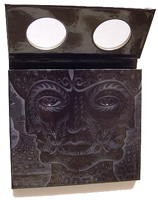« January 2007 | Main | March 2007 »
February 17, 2007
Eye Candy
I'm far too well-behaved to put this in my sidebar, though I was tempted. (There's a vertical version too). This is a mini-version, from last.fm, of my beloved iTunes screensaver. I wish it used all of my albums rather than just a few.
Posted by Alison Scott at 07:17 PM | Comments (0)
January Music
After eMusic got Topic records the other month, my 'most-wanted' label became Fellside; there are now 34 Fellside albums on there, including Bagpuss, Spiers & Boden, Witches of Elswick, Jez Lowe, Nancy Kerr & James Fagan, Peter Bellamy, Swan Arcade... Great stuff.
Anyway, music for January.
At Christmas my father gave me four CDs which he had recorded from LPs. I don't normally mention non-commercial recordings in these entries, but these albums are long out of print. I'm particularly pleased to have Burl Ives' "Lollipop Tree", a key album of my childhood. The title track will, I think, be the first song I'm prepared to play on the melodeon while singing when actual people can listen. Give me a few months. But another delight was AL Lloyd's "Selections from the Penguin Book of English Folk Songs" -- as far as I know not re-released on CD, and it drove my friends from the kitchen at New Year.
I occasionally pick up The Word magazine, which is sort of a music magazine for the Smash Hits generation; it even has many of the same writers. Obviously we're not quite the same people now. I think of it as a music and books and films and other stuff magazine for people who used to want to know what the lyrics were. It has a smashing cover CD each month; eclectic and interesting and almost worth the cover price just on its own. The stand-out track on Now Hear This 47, the Christmas edition, is "It's a Big Country", a 1981 song by Davitt Sigersen where he sends greetings to all his relatives. Quite one of the best Christmas songs of all time, and I'd never heard it before.
Moving quickly over the accompanying CD for Abracadabra Violin Volume 1, we come to Northern Light, a new old acoustic live album by Oysterband. This is a 'replacement' for the now unobtainable Alive and Acoustic. This is a recording of a different live show. It's probably only really for Oyb completists or anyone who doesn't have AAA, though the track listings aren't the same, and besides, I'm starting to treat folk songs as if they were master fonts; really, I want to own eighteen slightly different versions of the same song so that when I'm on shuffle, there's a deeper sense of variation. This album is available at gigs or mail order only.
I'm still picking up Topic albums on eMusic -- in January I got the last two June Tabor albums on eMu that I hadn't got already, Ashes and Diamonds and Rosa Mundi. I was very familiar with much of this stuff, but it's nice to have the albums. I also picked up three Waterson: Carthy albums; A Dark Light, Common Tongue and Waterson: Carthy. Although I owned most of Eliza Carthy's output before this, I had hardly anything by the older Watersons. I enjoy it well enough, and it's all marvellously well done, but I don't find it as engaging as much folk music. I don't know why.
 10,000 Days, by Tool. Bill Burns told me about this album, and I bought it instantly. I find it almost unlistenable. But it won a Grammy, for best packaging, and it was of course the packaging I bought it for. The album cover is a stereoscope, with a dozen or so 3d paintings to view, mostly of the band but also with some psychadelia from 3D artist Ray Zone. It's nice to see a band that considers how CDs can be packaged effectively. Oddly, I've discovered that three of the tracks are designed to be played simultaneously, and they do, surely, sound better that way. But not better enough.
10,000 Days, by Tool. Bill Burns told me about this album, and I bought it instantly. I find it almost unlistenable. But it won a Grammy, for best packaging, and it was of course the packaging I bought it for. The album cover is a stereoscope, with a dozen or so 3d paintings to view, mostly of the band but also with some psychadelia from 3D artist Ray Zone. It's nice to see a band that considers how CDs can be packaged effectively. Oddly, I've discovered that three of the tracks are designed to be played simultaneously, and they do, surely, sound better that way. But not better enough.
Damien Barber sang at our local folk club the other week, with Mike Wilson, and Steven and I had an animated discussion about whether we already owned The Furrowed Field. I won, we didn't, we now do. Rod Stradling did an animated dissection of this album; his criticism, that Barber's treatments are unduly influenced by modern re-interpreters of original song, is a fair one, and it was very noticable at the folk club. The one track that Stradling singles out because of how different it is from the original is "Down the Moor" -- presumably the sleeve notes don't mention the intermediate influence of Peter Bellamy. It's a minor thing, though; Damien's a great singer, and his band (the Demon Barbers) is even better.
Finally, Melodeon Greats is another of the Topic albums; this time of early recordings of melodeon. You would probably, in truth, have to be interested in melodeons to like this one.
Posted by Alison Scott at 01:47 PM | Comments (0)